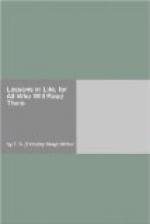“Ah! what a loving heart have I wronged!” she murmured, putting her hand upon the brow of her new-found child, tenderly. Then she drew her again almost convulsively to her bosom.
All that was passing within was heard without, for Charles and his sister were at the door: they entered at this moment.
“My mother!” exclaimed Charles, springing towards her.
“My son—my dear son! God bless you, and this dear child, who has watched for days and nights like an angel about my pillow.”
The mother and son were in each other’s arms in a moment. All was forgiven.
From that hour, the proud woman of the world saw with a purified vision. From that hour, she knew the worth of a pure heart.
SMITH AND JONES; OR, THE TOWN LOT.
Once upon a time, it happened that the men who governed in the municipal affairs of a certain growing town in the West, resolved, in grave deliberation assembled, to purchase a five-acre lot at the north end of the city—recently incorporated—and have it improved for a park or public square. Now, it also happened, that all the saleable ground lying north of the city was owned by a man named Smith—a shrewd, wide-awake individual, whose motto was,
“Every man for himself,” with an occasional addition about a certain gentleman in black taking “the hindmost.”
Smith, it may be mentioned, was secretly at the bottom of this scheme for a public square, and had himself suggested the matter to an influential member of the council; not that he was moved by what is denominated public spirit—no; the spring of action in the case was merely “private spirit,” or a regard for his own good. If the council decided upon a public square, he was the man from whom the ground would have to be bought; and he was the man who could get his own price therefor.
As we have said, the park was decided upon, and a committee of two appointed, whose business it was to see Smith and arrange with him for the purchase of a suitable lot of ground. In due form the committee called upon the landholder, who was fully prepared for the interview.
“You are the owner of those lots at the north end?” said the spokesman of the committee.
“I am,” replied Smith, with becoming gravity.
“Will you sell a portion of ground, say five acres, to the city?”
“For what purpose?” Smith knew very well for what purpose the land was wanted.
“We have decided to set apart about five acres of ground, and improve it as a kind of park, or public promenade.”
“Have you, indeed? Well, I like that,” said Smith, with animation. “It shows the right kind of public spirit.”
“We have, moreover, decided that the best location will be at the north end of the town.”
“Decidedly my own opinion,” returned Smith.
“Will you sell us the required acres?” asked one of the councilmen.




